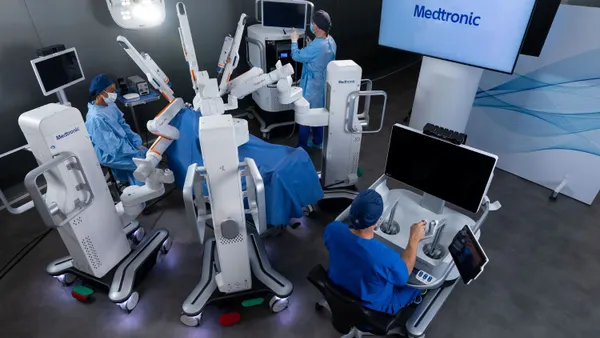Dive Brief:
- Zimmer Biomet has received breakthrough device status for an iodine-treated total hip replacement system, the company said Tuesday.
- The designation positions Zimmer to engage with the Food and Drug Administration as it works to bring the device to the U.S. market. Zimmer won approval for the device in Japan in September.
- Applying an iodine layer to orthopedic implants could stop bacteria from growing on the devices, thereby reducing the rate of potentially fatal post-procedure infections.
Dive Insight:
Bacteria that attach to the surface of implants can form biofilms that make it difficult to eliminate the microbes without removing the device. The problem is rare, with 1% to 2% of primary joint replacement patients having such joint infections, but potentially fatal. Patients with hip replacement infections have a three-year mortality rate of 11%.
The complication has fueled research into ways to stop bacteria from colonizing orthopedic implants. Zimmer has identified a controlled-release iodine surface treatment as a way to protect patients at higher risk of infection.
Interest in the approach reflects evidence that iodine is active against bacteria, does not cause the rise of drug-resistant strains and is safe to use in humans.
Zimmer has built on early research in Japan by combining a technology for applying iodine with its Taperloc Complete Hip System. The approach entails using anodization and electrophoresis to integrate a controlled-release iodine layer into the device. The layer could inhibit biofilm formation.
As Zimmer works to bring the device to the U.S. market, the company could benefit from regulatory interactions that are provided by the breakthrough program. The FDA pitches the program as a way to “efficiently address topics as they arise during the premarket review phase.”
Zimmer encountered challenges when trying to bring another anti-infection technology to the U.S. market. The company partnered with Bactiguard to develop implants with a technology to prevent post-operative infections in 2019 and expanded the alliance beyond the trauma field in 2022.
While Zimmer launched a trauma device in Europe, the company terminated the 2022 deal after the path to the U.S. market proved to be longer and more complex than expected. Zimmer CEO Ivan Tornos declined to directly answer an analyst question about the FDA’s views on iodine on an earnings call in May, saying only that “we do have a pathway to get this into the U.S.”












